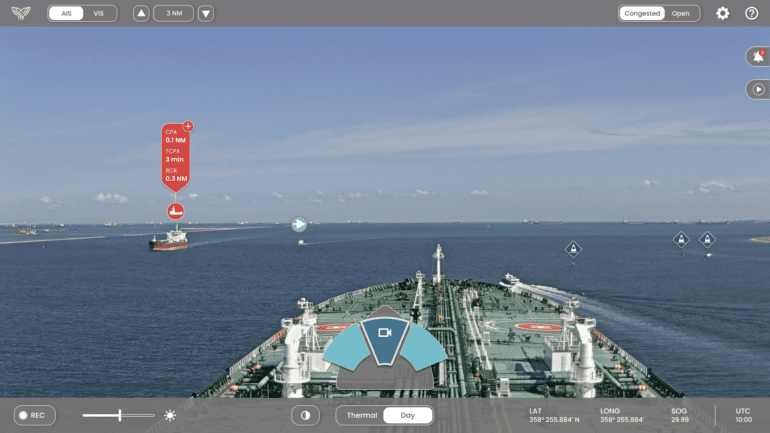TL;DR:
- Orca AI, an Israeli company, uses AI and computer vision to enhance situational awareness for maritime crews.
- Their platform reduces repetitive workloads, prevents sensory overload, and improves decision-making processes.
- Analysis involving 110 ships showed a significant reduction in close encounter events, sharp maneuvers, and extreme speed drops.
- These operational efficiency improvements led to a remarkable reduction in CO2 emissions.
- Orca AI has the world’s largest visual database of the oceans and is actively involved in autonomous vessel trials.
- Their goal is to develop intelligent ships capable of making autonomous decisions based on data and communication with other vessels and onshore personnel.
Main AI News:
Artificial Intelligence (AI) is the driving force behind innovative solutions in today’s market and is propelling the next generation of navigation tools that address the challenges faced by industries. However, the true test for AI lies in the “shift in mindsets and behaviors,” according to Yarden Gross, the CEO and co-founder of Orca AI—a pioneering Israeli company that develops a smart situational awareness platform for the maritime sector.
Gross emphasizes that while changing mindsets takes time, the data provided by Orca AI can expedite this evolution, which is an integral part of the shipping industry’s digitalization journey. Orca AI has developed a platform that enhances the understanding of navigation situations for onboard crews through the utilization of computer vision, AI technologies, and existing onboard sensors.
By employing an automated lookout system that mimics human watchkeeping processes 24/7, Orca AI not only improves situational awareness for the crew but also reduces repetitive workloads, prevents sensory overload, and mitigates fatigue. Moreover, the platform facilitates seamless communication between ships and onshore teams, granting office-based staff access to crucial data such as speed variations, abrupt maneuvers, and close encounter events.
Recently, Orca AI conducted an analysis involving 110 ships, including tankers, containers, bulkers, and roros, all equipped with their platform throughout 2022. The results are impressive, showcasing a significant 26.9% reduction in close encounter events, a notable 21.6% decline in sharp maneuvers, and a commendable 18% reduction in extreme speed drops. Gross proudly points out that these operational efficiency improvements led to a total reduction of 66,300 tonnes in CO2 emissions.
Gross’s background in the Israeli Navy played a crucial role in the inception of Orca AI. It was during his time in the navy that he crossed paths with Dor Raviv, Orca AI’s co-founder, who specialized in unmanned vessels. Even after Gross transitioned to the automotive industry, where he witnessed the growing adoption of autonomous technology, the duo stayed in touch and pondered the necessary steps to introduce autonomous capabilities to the shipping industry. Thus, Orca AI was born.
The pair quickly realized that the technology employed in navy vessels far surpassed that used in commercial shipping. Motivated by the alarming number of over 4,000 maritime incidents occurring annually, they set out to explore how they could leverage this technology to enhance safety and efficiency within the industry. Their goal was to introduce AI solutions that could aid navigation, prevent collisions, empower crews, and support their decision-making processes as they navigate the demanding requirements of the global supply chain.
In 2019, Orca AI received its initial investment from Playfair Capital, followed by a $13 million funding round in 2021 led by OCV Partners, with participation from Mizmaa Ventures and Playfair Capital. The company anticipates further funding updates later this year.
Gross proudly states that Orca AI possesses the world’s most extensive visual database of the oceans, capturing over 10 million nautical miles of footage since 2019. Moreover, the company is at the forefront of the autonomous vessel revolution, having participated in the world’s first successful trial in Japan last year. This groundbreaking trial, conducted by the Nippon Foundation in collaboration with the Designing the Future of Full Autonomous Ships (DFFAS) consortium—comprising 30 Japanese firms and Orca AI—involved a vessel navigating autonomously for 40 hours, with autonomous systems activated 98% of the time.
Gross envisions a future where ships possess advanced intelligence and make autonomous decisions based on data, effortlessly traversing from point A to point B while maintaining seamless communication with other vessels and onshore personnel. While achieving full autonomy will be a gradual process, these intelligent ships will have the capability to make prompt and informed decisions tailored to specific operations. Gross provides an example, stating that being efficient does not always equate to being fast, and thus, AI will analyze and summarize the best course of action for a company based on its customers’ requirements.
Moving forward, Orca AI plans to continue evolving its technology to meet the growing interest in its platform. The company remains committed to advancing autonomous vessel trials and will provide further updates in due course.
Conclusion:
Orca AI’s innovative AI-powered solutions are revolutionizing the maritime industry. By enhancing situational awareness, reducing incidents, and optimizing operational efficiency, Orca AI is making navigation safer and more efficient. The company’s advancements in autonomous vessel trials and its extensive visual database position them as a leader in the industry. As the market embraces digitalization and autonomous capabilities, Orca AI is poised to play a significant role in shaping the future of maritime navigation.

